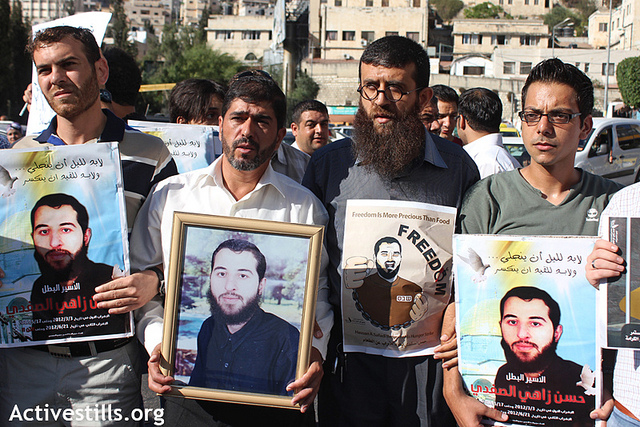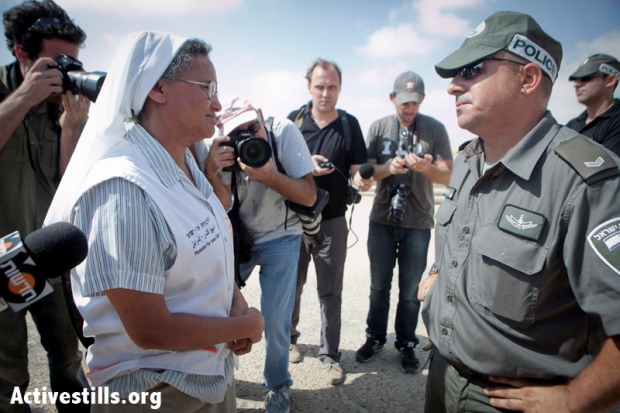In the case of the refugees trapped on the Israeli border, as in the matter of hunger striking prisoner Khader Adnan, Israel’s highest court wriggled out of a decision, escaping the shackles of democracy and international law that are supposed to guide its work.

Last February, a Palestinian prisoner in an Israeli jail was on the verge of death, more than two months into a hunger strike he had launched in protest of his administrative detention order under Israeli military law. On Sunday, February 19, the High Court of Justice agreed to hear Khader Adnan’s petition against the order – and scheduled the hearing for five days later, the following Thursday. The date came as a surprise, as it was clear that Adnan might not make it that long. Indeed, as his condition rapidly deteriorated, the High Court agreed to move the hearing up by two days. But before it could rule on the petition, which challenged the entire administrative detention system, the state struck a deal with Adnan’s attorneys, securing his agreement to call off his strike in exchange for a guaranteed release two months later.
Yesterday marked the end of a saga that saw 21 Eritrean asylum seekers stranded for seven days behind a fence on the Israel-Egypt border in the scorching desert sun. They had all made the harrowing journey through Sinai, likely enduring the horrors of notorious torture camps run by human smugglers in the desert peninsula. The Israeli soldiers stationed on the border were instructed to give the asylum seekers little water and no food, and aid workers were refused access to them. Refugee rights organizations petitioned the High Court of Justice to demand Israel adhere to principles of international refugee law and allow the asylum seekers entry to submit their refugee claims. The High Court heard the petition on Thursday, but decided to wait until Sunday to hand down its decision, leaving the group languishing in the desert. But several hours later, the state announced it had reached a “deal” with the asylum seekers, whereby two women and a child were allowed entry, while 18 men were delivered to the hands of Egyptian soldiers.

What do these stories have in common? In both cases, justice for imprisoned non-Israelis was sought in Israel’s highest court. In both cases, the court made a concerted effort to evade a decision, enabling the state to tailor a solution in accordance with its perceived interests. In both cases, the court wriggled out of ruling on the merits of the cases, escaping the shackles of democracy and international law that are supposed to guide its work.
In refraining from deciding, the court gave the state a green light to sustain practices that bear no relation to due process, judicial oversight, separation of powers, or human rights. Israel’s policy of administrative detention sanctions the indefinite imprisonment of Palestinians who may never know the charges against them. Its roots are in a military court system critical to maintaining the occupation, in which the judges wear the same uniforms as the prosecutors, and where security interrogations need not be filmed and are rarely questioned.
Globally, up to 90 percent of Eritrean asylum seekers are recognized as refugees in need of international protection. In Israel, tens of thousands of Eritreans are demonized as “infiltrators” and a demographic threat, and refused access to Israel’s asylum procedure. It is true that they are not deported to Eritrea, a military dictatorship most commonly compared to that of North Korea. But even that hurdle was surmounted on Thursday, as it has been many times before, when Israel went against United Nations pleas and forced Eritrean refugees into Egypt, where evidence shows they could once again fall victim to their torturers in Sinai, or be deported to Eritrea.
It seems that non-citizens in Israeli jurisdiction remain on the outer reaches of the law. The High Court perceived no urgency in deciding the fates of humans driven by the state to extreme physical conditions that posed a real threat to their lives. Instead, it chose to suspend justice, to give the state room to find one-time “solutions” instead of setting precedents requiring Israel to treat foreign peoples in accordance with principles of democracy and human rights. What would it take for Palestinians to find justice in Israeli courts, or for refugees to secure asylum on Israeli soil? Can principles of justice ever apply in a system that cooperates with the state to withhold standards of law reserved for Jewish citizens only?
Noa Yachot is the managing editor of +972.

